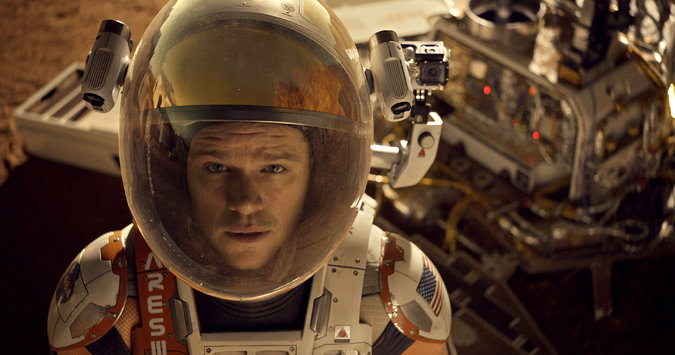OCTOBER 5, 2015
Have I got a movie for you. It’s about a U.S. astronaut who finds himself stranded alone on the Red Planet who must use his wits to find food, water and shelter. That’s right, it’s 1964’s “Robinson Crusoe on Mars,” a B-movie designed as fodder for drive-ins that has maintained a cult reputation through the years through some clever writing and some cheesy effects. There’s a pet monkey named Friday. Plus some extras dressed up in alien suits. And it wasn’t directed by Ridley Scott.
Thank God Scott is at the helm of “The Martian,” the director’s third film venture into deep space. What was striking about his first two, the classic “Alien” (1979) and the dreadful “Prometheus” (2012), were similar tones — life in space was dark, claustrophobic and always threatening. The tone of “The Martian” is very different with space being light and spatial (if still always threatening).
During an exploratory mission on the surface of Mars, astronaut Mark Watney (Matt Damon) and his four crew members are hit with an unexpectedly powerful storm, and while they try to make their way back to their spaceship Hermes, Mark is hit by a piece of flying debris and knocked back far into the darkness. His friends want to save him, but there is no life response beeping from his suit. With their own safety at stake, they must presume that he is dead and barely make it back to Hermes in time to take off from the planet’s surface.
Only Mark is alive and abandoned on Mars. Aware that it would take four years for NASA to complete a rescue mission and that he would run out of food, water and oxygen long before then, Mark must rely on his wits to survive. Luckily, he is also a botanist, and his training quickly turns to survival mode: “I’m going to have to science the shit out of this.”
That wonderful line appears nowhere in the best selling novel by Andy Weir but is instead the creation of screenwriter Drew Goddard (who also wrote the underrated “The Cabin in the Woods”). In fact, the tone of the early Mars scenes is surprisingly jaunty, as Mark uses his brainpower to devise a way to expand his food supply, all the while trying to find some way to contact NASA.
Unlike other survival sagas such as “Cast Away” and “All is Lost,” Mark is not alone in “The Martian.” Much of the story unfolds in two other locales. The first is back on Earth, where NASA faces a dead-astronaut PR crisis and gets a further shock two months later when satellite photos pick up that Mark is actually alive. At that moment, as the botanist is using his own smarts on Mars, the scientists and engineers at NASA and JPL kick into action to try to establish some kind of communication with the marooned Mark.
The third platform is on the Hermes where, while on their way home, the crew learns that their friend is still alive on Mars and try to devise a way where they can redeem themselves and bring the man they abandoned back to Earth.
Scott has always been attracted to stories where a large ensemble must work together, and for “The Martian,” he has attracted a particularly deep bench of A-list actors to provide support, both for the scenes on Earth (Chiwetel Ejiofor, Jeff Daniels, Kristin Wiig, Sean Bean and Donald Glover among many others) and those on the Hermes (including Jessica Chastain, Michael Peña and Kate Mara). All are excellent.
I had a few friends remark that the all-star cast became a distraction, and they were unable to see the character before the actor. But I think that’s the whole point. This is a big Hollywood production, one that never ever forgets that fact, and movie stars are a major part of the entertainment. Besides, since much of the script’s expository material is scientific gobbledygook, you need actors of the caliber of Chastain and Ejiofor to be able to sell it and maybe convince us that we understand it too.
Still, the whole film rests on the back of Matt Damon, one of our finest film actors who has the singular ability to reveal complexity in a character all within an everyman persona. Mark provides Damon with an opportunity to display a range of emotions from sarcasm to despair to hope, and he delivers in every scene. This is some of his finest work ever.
As the film’s third act changes the story from a survival tale to one of attempted rescue, the focus begins to shift away from Mars to NASA and the Hermes, forcing Mark to recede a bit from the story, which is a bit of a loss. And while the film’s disco soundtrack (it’s the only music Mark’s team left for him to play on Mars) ups the film’s fun factor, it’s a little too close to how pop songs were used in “Guardians of the Galaxy.”
But these are quibbles. “The Martian” is a rousing entertainment that’s funny and suspenseful, while being thoughtful and inspiring. This is Ridley Scott in top form. Cheers too to Dariusz Wolski’s expressive cinematography — he manages to make Jordan (where much of the film was shot) look both like the surface of Mars and Monument Valley. And Goddard’s terrific script manages both to pay tribute to the imagination and determination of one man, as well as to the global cooperation of nations around the world who are willing to share their technology to save the life of that one man.
Finally, it’s a celebration of science and those who apply their brains to make the world a better place. After a season of hearing science derided and dismissed from the podium of Presidential political debates, it’s so refreshing to be reminded of the truth, even if it’s from a Hollywood blockbuster.
GRADE: B+












